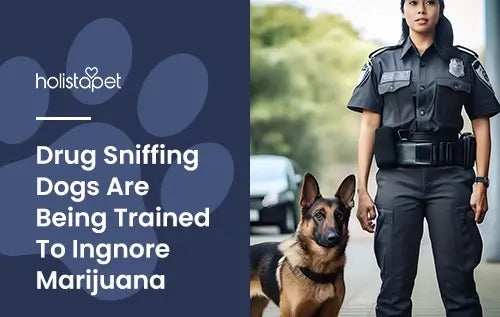Drug detecting dogs have been controversial since police departments started using them nearly seven centuries ago. To some, these canine cops are heroic figures. Others see them as infringing on their right to privacy or exploiting animal labor. Drug dogs have become a particular annoyance to consumers of hemp-derived CBD products, which are federally legal, but sometimes smell the same as marijuana. Plus, many states have now legalized cannabis entirely, which is why some drug sniffing K9s are being trained to ignore marijuana.
History of Police Dogs
The first record of police harnessing a dog's sense of smell as a tool came in 1888, when the London police tried using bloodhounds to track the scent of Jack the Ripper. Of course, the notorious killer was never identified, but enough people saw potential in trained dogs to keep them on the force.

Detection dogs first became popular in the United States during World War II, when the army used them to sniff out bombs and landmines. The drug dog became a staple of American police departments in the 1970s when Richard Nixon launched the "War on Drugs." Since then, police and private security teams around the nation have used dogs in almost every drug search they conduct.
Drug Sniffing Dog Breeds
Not every breed can make it as a police dog. Can you imagine a Miniature Dachshund chasing the scent of a criminal for miles on end? It would be adorable but probably inefficient. When police officers look for a drug sniffer dog, they typically turn to these breeds:
- English Springer Spaniel
- Border Collie
- Belgian Malinois
- German Shepherd
- Labrador Retriever
How Are Drug Detection Dogs Trained?
A police handler needs to train each dog to detect drugs and alert authorities to their location. Proper training for police dogs begins the same way you would train your dog — with simple commands like "sit" and "stay." These routine training steps get the dog accustomed to following instructions and receiving rewards for obeying each command.
The next step of training centers on lighthearted play. The handler gives the dog a simple toy that does not have a scent, like a blanket, and plays with them. Once the dog grows attached to their plaything, the handler wraps the toy around a package of illicit drugs. Soon, they have the dog trained to associate the smell of the drug with their favorite toy.
Then, the trainer presents the dog with a challenge. They hide the drug-filled toy in a series of increasingly hard-to-find spots and see if the dog can sniff it out. When the dog succeeds, they get a reward in the form of a treat.
Are Drug Dogs Accurate?
There are serious concerns about drug dogs giving false alerts and serving as an excuse for police to search innocent people. In a 2011 study of 18 police dogs, they incorrectly identified the scent of drugs over 200 times. During the study, researchers told the police handlers that they hid target scents in four different rooms.
In reality, there were no scents – the police just thought there were. Nevertheless, the dogs "detected" target scents in every room. This suggests that the police handlers have a significant influence on their canine charges, driven by confirmation bias.
Why Are Drug Dogs Being Trained To Ignore Cannabis?
Governments on the federal and state level have made big changes to cannabis laws in the past few years. Numerous states have now legalized marijuana for medicinal or recreational purposes, and the federal government has legalized hemp products. The criminal justice system needs to keep up with these changes, which means that police dogs don't need to sniff out cannabis anymore.
The Future of Police Dogs
Many police departments have stopped training police dog breeds to detect cannabis, and it could only be a few more years before all police dogs have been trained this way. The change in policy has some people worried about police dogs losing their jobs. In all likelihood, these dogs should be secure in their jobs because there are many other illegal drugs that police want to search people for. However, many are in favor of removing drug dogs from law enforcement altogether.
Police Dog Controversy
Many social justice groups have expressed concern about law enforcement using K9 dog breeds as an excuse to conduct searches of innocent citizens. Police are not allowed to search you unless they have "probable cause," meaning they need a specific reason to suspect you have done something illegal. If a drug dog thinks they smell something on you, it is probable cause for the police to search you.
Since drug dogs have been shown to be inaccurate in many cases, activists have argued that they only serve as a convenient excuse for police to search anyone they want. Many would like to see an end to K9 units. Of course, this would put the nation's police dogs out of work, which also concerns many people. However, there are many other jobs that dogs can take on!
Other Jobs for Dogs
Outside of law enforcement, there are many other roles for dogs in our society. A recent example comes from the University of Pennsylvania School of Veterinary Medicine, where they trained Labradors to detect COVID-19! Here are a few other jobs that working breeds excel at:
- Herding livestock
- Runaway wildlife control
- Mobility-assistance
- Seeing-eye dogs
- Pest control

Final Thoughts
Cannabis laws in this country are rapidly evolving, which has made it unnecessary for police dogs to seek out marijuana. This is probably for the best because police dogs are often inaccurate, and they frequently mistake legal hemp products for illegal marijuana. The exciting implication of this change is that the nation's opinions of cannabis are evolving.
FAQ
How does the shift away from cannabis detection affect the overall cost of training police dogs?
Transitioning drug-sniffing dogs to ignore marijuana might reduce training complexities and costs, as handlers can focus on other illegal substances without the need for reconditioning.
Are there any emerging technologies that might replace drug-sniffing dogs in law enforcement?
Advancements in chemical sensors and artificial intelligence are being explored as potential alternatives to canine detection in identifying drugs and other contraband.
How do legal changes to cannabis laws impact the training timeline for police dogs?
Training programs now prioritize other substances, potentially shortening the timeline as cannabis is removed from the list of detectable scents.
What happens to police dogs that are retired or no longer used for drug detection?
Retired police dogs often find homes with their handlers or specialized adoption programs, where they transition into companion roles.
How do different states with varying cannabis laws address drug-sniffing dog training?
States with legal marijuana may require police departments to modify or eliminate cannabis detection from their dogs' training, while others with stricter laws might retain it.
Can drug-sniffing dogs distinguish between hemp and marijuana?
No, drug-sniffing dogs cannot differentiate between hemp (legal) and marijuana (illegal in some jurisdictions), which is one reason for phasing out cannabis detection.







![Probiotics For Dogs [Soft Chews] - HolistaPet](http://www.holistapet.com/cdn/shop/files/Probiotic-Infographic-1_472d7a29-e30c-435a-9638-1365d8c3a9f9.jpg?v=1725384841&width=104)



























Leave a comment
All comments are moderated before being published.
This site is protected by hCaptcha and the hCaptcha Privacy Policy and Terms of Service apply.